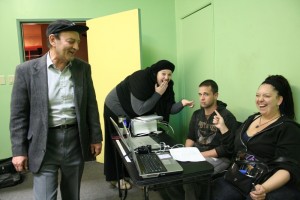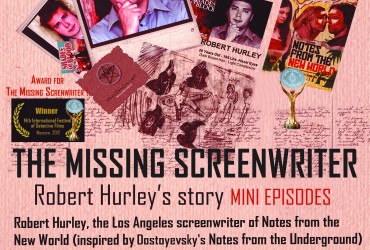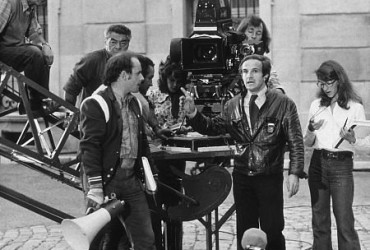Vitaly Sumin – portrait of the artist as a young man – in Terijaki (Zelenogorsk) – resort town near St.Petersburg, Russia – on the shore of the Gulf of Finland.
1. Q: What was it like working with the unknown actors?
A: Much better than with “known” actors.
2. Q: If you had to do it all over again what would you do differently?
A: I wouldn’t do it again. I would simply make another movie.
3. Q: What did you learn from directing films?
A: It’s better to watch films than to make them.
4. Q: Who are your influences?
A: Bergman, Truffaut, Kubrick, Kurosawa, Hitchcock…
5. Q: What do you see as the future of filmmaking?
A: And you?
6. Q: Do you view your film as an adaptation of Dostoyevsky’s work or a
continuation of it?
A: Notes from the New World is both an adaptation and a continuation of Dostoyevsky’s work. At the same time, it’s a re-telling. What’s important are the ideas and themes of the original writing. I’ve never been particularly
interested in the exact re-creation of stories by classical authors, including the appropriate attributes of the corresponding historical time period involved. For me, every classic work of fiction is a template serving as basis for explorations of our own age.
 Vitaly Sumin on the set of Notes from the New World – L.A., Ca. Break time! Funny moments with the art department’s guys (click on the picture!).
Vitaly Sumin on the set of Notes from the New World – L.A., Ca. Break time! Funny moments with the art department’s guys (click on the picture!).
7. Q: Beyond the storyline you have developed in your film, what is your broader message regarding the state of society both in America and throughout the world?
A: Well, we’re living in an unprecedented time of technological revolution and the fall of the walls. Hamlet who lived at the time of another revolution–the passage from Renaissance to Baroque–stated that “time has dislocated the joint!”—which I’m citing from memory. Whatever happens in a faraway corner of the world may become known right away anywhere in the world.
The problem is that to change a living human being in an evolutionary way requires a longer time, if it’s ever possible. Most, if not all, social revolutions that intended to quickly change the world failed but provided us with experience. On the other hand, the technological revolution made some dreams come true; in a way, the world has become one.
Steven, hero of Notes From The New World, who is assigned to portray a modern Underground Man in the Los Angeles of 2011, claims: “Not all civilizations progress at the same pace, but then the losers use bombs to make all of us equal.”
8. Q: Describe the process that you went through to develop a “life imitates art” storyline where the characters are actually living the modern version of the play in which they are acting on screen.
A: When an actor performs on stage, a process of identification with a character takes place. Depending on the degree and scope of the identification, an actor may need some time to “get back” and restore his or her inner self. In the story of Notes From The New World, Steven, a young actor at the beginning of his career, is asked by Bob, a mad Machiavellian-type director and playwright, to perform the part of the Underground Man in real life. Once Steven puts on the mask of the Underground Man, there’s no way back — he’s entering a world of mythical forces that will push him all the way through the labyrinth into the Unknown. .
9. Q: How is the action in your film juxtaposed against the futility of the Underground Man and his inability to change either himself or the society he blames for his misery?
A: Every common man of no particular influence or stature throughout history has felt that he has no real control over his own fate. In today’s modern society, however, the common man has the illusion of control of his own destiny through technology. And even though Steven is surrounded by elements of modern technology–such as the spy cameras throughout his living quarters being used to help him develop his part–he ultimately finds that he’s not the one controlling them. He only had the illusion of control. As such, he is really no different than the Underground Man that he is researching.
10. Q: DO YOU SEE YOURSELF AS AN UNDERGROUND MAN?
A: From time to time.
**************
MORE INTERVIEWS WITH VITALY SUMIN:
Interview with Vitaly Sumin – April, 2017
From St.Petersburg, Russia to Los Angeles, California – via Paris, France
An Interview With Director Vitaly Sumin by Lisa Pinckard
Vitaly Sumin: Life, Dreams, and Perspective







Leave a Reply